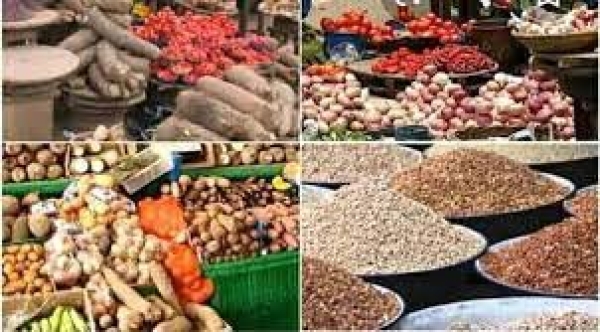President Bola Ahmed Tinubu-led federal government has continued to foot-drag in the implementation of zero import tariff waiver on selected food items months after the kickoff announcement, DAILY POST reports.
The food items to enjoy the zero tariff include husked brown rice, grain, sorghum, millet, maize, wheat and beans for 150 days spanning from 15th July to 31 December 2024.
The tariff waiver was first announced by the Minister of Finance, Wale Edun in June 2024 as part of President Tinubu’s administration fiscal policy measures to cut down on the prices of food.
In July 2024, the Comptroller General of NCS, Bashir Adewale Adeniyi reaffirmed the government’s commitment towards the commencement of the tariff waiver.
The policy was expected to kick off on August 14, 2024, when the Customs in a statement announced the rollout of detailed guidelines towards the implementation of the tariff waiver.
“Nigeria Customs Service (NCS) is pleased to announce that His Excellency, the President of the Federal Republic of Nigeria Bola Ahmed Tinubu GCFR through the Honourable Minister of Finance and the Coordinating Minister of the Economy, Olawale Edun has approved the regulation for the implementation of a Zero Percent Duty Rate (0 percent) and Value Added Tax (VAT) exemption on selected basic food items.
“This measure aims to mitigate the high cost of food items in the Nigerian market by making essential commodities more affordable for citizens”, Customs stated.
However, months after the announced tariff waiver, Nigerians have lamented that the policy was yet to see the light of the day.
This is as the objective of reducing the prices of food items remained unachieved while the majority of Nigerians groan at the very rising cost of living.
DAILY POST reports that despite the National Bureau of Statistics inflation data for July and August which showed food inflation eased to 39.53 and 37.52 percent, market realities showed that the prices of food and goods remained high.
A market survey by DAILY POST on Monday showed that a 50-kilogram bag of local or foreign rice is sold between N87,000 and N106,000.
This is as a 50kg bag of beans goes for between N65,000 and N100,000. For the majority of Nigerians, access to staple food has become a nightmare, a situation that would have been reduced with the implementation of the zero-tariff waiver on selected food items.
Speaking on the development in an interview with DAILY POST on Monday, the Executive Director of the Centre for the Promotion of Private Enterprise, Muda Yusuf said the major problem was the slow pace with which the government was implementing the zero tariff policy.
According to him, there was a big lag between the announcement of the policy by the government and the preparation of the guidelines for its implementation.
He stressed that the tariff waiver had not been fully activated as the impact was yet to be felt in the country’s economy.
Yusuf urged the government to work on the speed of implementation of the policy.
“The customs must implement the policy. The customs need to be advised by the ministry of finance, and until that is done, implementation cannot start.
“I think it has to do with the speed of the implementation of the policy. When the Government announces a policy, the ministry ought to work on the guidelines, which are transmitted by the ministry of finance to the customs. I think there is a lag between the announcement of the policy and the production of the guidelines.
“The policy has not been fully activated which is why the impact is not felt. This is because all the processes in terms of guidelines are a bit slow. The government needs to work on the speed of implementation”, he told DAILY POST.
On his part, Olufemi Kayode, a member, Association of Nigeria Licensed Customs Agents, ANLCA, and Special Assistant to Prince Adewusi Bamigbala, the Chairman of ANLCA, Murtala Muhammed International Airport Command Chapter, faulted Customs, noting that there was yet to be a clear-cut and proper guideline for the implementation of the zero tariff policy.
He stated that there was the possibility of internal sabotage and frustration within the Customs that may be undermining the implementation of the tariff for the good of the generality of Nigerians.
“Generally speaking, from the circular available there are no clear-cut directives apart from the fact that some of the tariffs were mentioned.
“There are no proper guidelines for its implementation. The Customs must put it into proper perspective.
“There is the possibility of internal sabotage or frustration in getting the implementation right.
“Customs may be having internal challenges about the proper classification or coding of the tariff waiver into its portal”, he said.
Meanwhile reacting to the development, in an exclusive chat with DAILY POST, NCS spokesperson, Abdullahi Maiwada said it was untrue that the service was sabotaging the implementation of the zero-tariff waiver policy on selected food items.
According to him, the Service had told Nigerians the procedures for accessing the tariff waiver.
He added that the NCS was committed to all policies formulated by the government to ease the economic hardship Nigerians faced.
“Well, we have issued a statement earlier and we told Nigerians procedures of accessing the tariff waiver.
“It is malicious to say Customs is sabotaging the implementation of the policy.
“We are a responsible government agency. We are out to implement all policies formulated by the government.
[DailyPost]


